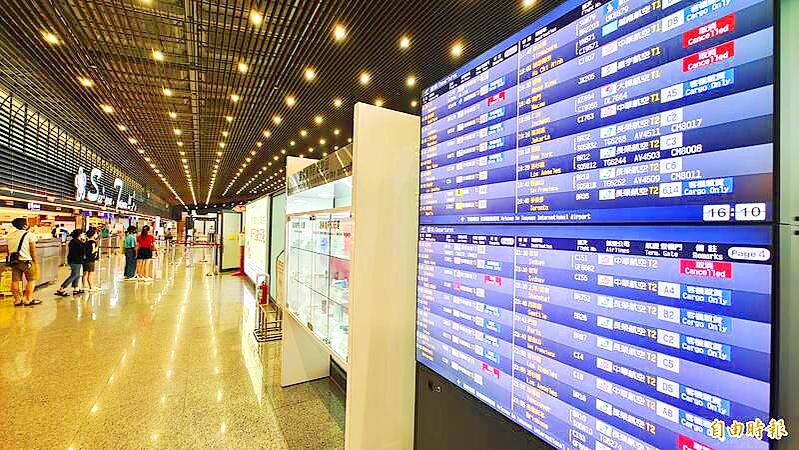China’s military exercises in the Yellow Sea and Bohai Bay would not disrupt flight services in the Taipei Flight Information Region, but container ships would have to bypass the areas, the Ministry of Transportation and Communications said yesterday.
China’s Lianyungang Maritime Safety Administration on Friday announced that it was banning the entry of ships into certain areas south of the Yellow Sea from Saturday last week to Monday next week due to live-fire drills by the Chinese People’s Liberation Army.
China’s Dalian Maritime Affairs Bureau announced that entry to certain areas of Bohai Bay would be prohibited from yesterday to Sept. 8 due to military exercises.

Photo: Chen Hsin-yu, Taipei Times
China’s military exercises in Bohai Bay and areas south of the Yellow Sea would not disrupt international flight routes to and from Taiwan as they would not fall within the Taipei Flight Information Region, the ministry said.
However, the Maritime and Port Bureau has warned Yang Ming Marine Transport, Evergreen Marine Corp and Wan Hai Lines to avoid sending their container ships through these areas for safety reasons, it said.
The nation’s flight and shipping services have gradually resumed normal operations after all seven temporary danger zones China unilaterally declared last week expired yesterday.
Six of the zones expired at 12pm on Sunday, while the last danger zone expired at 10am yesterday, the ministry said.
The Civil Aeronautics Administration (CAA) and Maritime and Port Bureau would continue to guide aircraft and sea vessels to bypass the temporary danger zones to ensure their safety, the ministry said, adding that inbound, outbound and transit flights must avoid the seven temporary danger areas and operate on alternative routes.
On Sunday, the nation had 138 outbound flights, 145 inbound flights and 147 transit flights, CAA data showed.
From Thursday to Sunday, Taiwan had about 150 inbound flights and the same number of outbound flights daily, the ministry said, adding that China’s military drills did not lead to a drastic reduction in arriving or departing flights.
Transit flights gradually resumed after six of the seven temporary danger zones expired, it said, adding that air traffic control offices across the nation would carefully monitor the situation to ensure flight safety.
In terms of shipping services, China’s military drills mainly affected the vessels accessing the Port of Keelung, the Port of Taipei and the Port of Kaohsiung, the ministry said.
Vessels entering and leaving these ports must avoid entering the temporary danger zones, it said.
Maritime and Port Bureau data showed that seven international commercial ports around Taiwan on Sunday recorded 118 inbound and 120 outbound ships, which was not much different from the previous three days, the ministry said.

The manufacture of the remaining 28 M1A2T Abrams tanks Taiwan purchased from the US has recently been completed, and they are expected to be delivered within the next one to two months, a source said yesterday. The Ministry of National Defense is arranging cargo ships to transport the tanks to Taiwan as soon as possible, said the source, who is familiar with the matter. The estimated arrival time ranges from late this month to early next month, the source said. The 28 Abrams tanks make up the third and final batch of a total of 108 tanks, valued at about NT$40.5 billion

A group from the Taiwanese Designers in Australia association yesterday represented Taiwan at the Midsumma Pride March in Melbourne. The march, held in the St. Kilda suburb, is the city’s largest LGBTQIA+ parade and the flagship event of the annual Midsumma Festival. It attracted more than 45,000 spectators who supported the 400 groups and 10,000 marchers that participated this year, the association said. Taiwanese Designers said they organized a team to march for Taiwan this year, joining politicians, government agencies, professionals and community organizations in showing support for LGBTQIA+ people and diverse communities. As the first country in Asia to legalize same-sex

Travel agencies in Taiwan are working to secure alternative flights for travelers bound for New Zealand for the Lunar New Year holiday, as Air New Zealand workers are set to strike next week. The airline said that it has confirmed that the planned industrial action by its international wide-body cabin crew would go ahead on Thursday and Friday next week. While the Auckland-based carrier pledged to take reasonable measures to mitigate the impact of the workers’ strike, an Air New Zealand flight arriving at Taipei from Auckland on Thursday and another flight departing from Taipei for Auckland on Saturday would have to

MOTIVES QUESTIONED The PLA considers Xi’s policies toward Taiwan to be driven by personal considerations rather than military assessment, the Epoch Times reports Chinese President Xi Jinping’s (習近平) latest purge of the Chinese People’s Liberation Army (PLA) leadership might have been prompted by the military’s opposition to plans of invading Taiwan, the Epoch Times said. The Chinese military opposes waging war against Taiwan by a large consensus, putting it at odds with Xi’s vision, the Falun Gong-affiliated daily said in a report on Thursday, citing anonymous sources with insight into the PLA’s inner workings. The opposition is not the opinion of a few generals, but a widely shared view among the PLA cadre, the Epoch Times cited them as saying. “Chinese forces know full well that